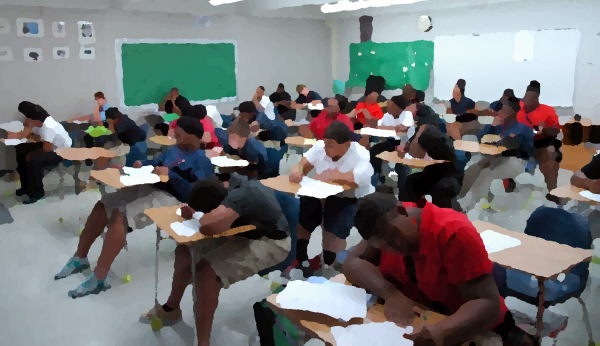Dear Terrence,
 Today was it. I do honestly like you all; I do honestly believe in your abilities and your intelligence; I do honestly see in you potential. But you all don’t see it in yourself, and because of that, you disrupt. Constantly. We’ve been in school three weeks now, and you’ve shown me that when given the chance to act like adults, you act like infants: you fuss about infantile things, you laugh uproariously and chaotically about infantile things; you fight over infantile things; you talk constantly about infantile things. You’ve shown me you’re just not ready to be treated like adults. What this means is that I must treat you like children. I must seem harsh in order to protect you, from yourselves and from your self-destructive habits. And so tomorrow, though I don’t really want to, I will be putting my foot down. That’s a cliche that doesn’t really adequately explain just how hard I’m going to hit you all tomorrow, so to speak. I expect to send at least ten students – that’s fully one third of you – to the assistant principal for being disruptive, because I’m going to define “disruptive” in such a harsh way that sneezing might get you sent from the room. I do this because you can’t handle the slightest amount of freedom: one off-hand comment to a peer turns into complete chaos in the class in a matter of seconds. One giggle sets ten others giggling. You are lemmings, robots – your behavior is so predictable. And so I am going to make my behavior equally predictable.
Today was it. I do honestly like you all; I do honestly believe in your abilities and your intelligence; I do honestly see in you potential. But you all don’t see it in yourself, and because of that, you disrupt. Constantly. We’ve been in school three weeks now, and you’ve shown me that when given the chance to act like adults, you act like infants: you fuss about infantile things, you laugh uproariously and chaotically about infantile things; you fight over infantile things; you talk constantly about infantile things. You’ve shown me you’re just not ready to be treated like adults. What this means is that I must treat you like children. I must seem harsh in order to protect you, from yourselves and from your self-destructive habits. And so tomorrow, though I don’t really want to, I will be putting my foot down. That’s a cliche that doesn’t really adequately explain just how hard I’m going to hit you all tomorrow, so to speak. I expect to send at least ten students – that’s fully one third of you – to the assistant principal for being disruptive, because I’m going to define “disruptive” in such a harsh way that sneezing might get you sent from the room. I do this because you can’t handle the slightest amount of freedom: one off-hand comment to a peer turns into complete chaos in the class in a matter of seconds. One giggle sets ten others giggling. You are lemmings, robots – your behavior is so predictable. And so I am going to make my behavior equally predictable.
I expect to get calls from parents. I expect to see frustrated students. But I’m doing it for one reason: I will not let you screw up your own education because you find everything else in your tragic world more important.
So take a deep breath, and hope for a change in everyone else soon, because you can only change yourself, no one else. And until you do, all privileges in my classroom are indefinitely suspended. I know it sounds like I’m angry when I say this, and I am, but I’m not doing this to make my life easier or to torture you: I’m doing it to protect you.
Tying my boot laces already,
Your Teacher
 It was a judgement call, really. I could have simply told everyone to get over it, but I thought I might use the situation to win some points with you guys. Besides, when I heard you say, “Man, my mom paid $140 for these shoes,” I knew that it wouldn’t just blow over. You would spend all your time trying to wipe the grass from your shoes, and you’d likely mutter your displeasure at having to do so, and that would only drag your neighbors into the frustration, and soon the whole class would follow. So the paper towels were preventative.
It was a judgement call, really. I could have simply told everyone to get over it, but I thought I might use the situation to win some points with you guys. Besides, when I heard you say, “Man, my mom paid $140 for these shoes,” I knew that it wouldn’t just blow over. You would spend all your time trying to wipe the grass from your shoes, and you’d likely mutter your displeasure at having to do so, and that would only drag your neighbors into the frustration, and soon the whole class would follow. So the paper towels were preventative.

